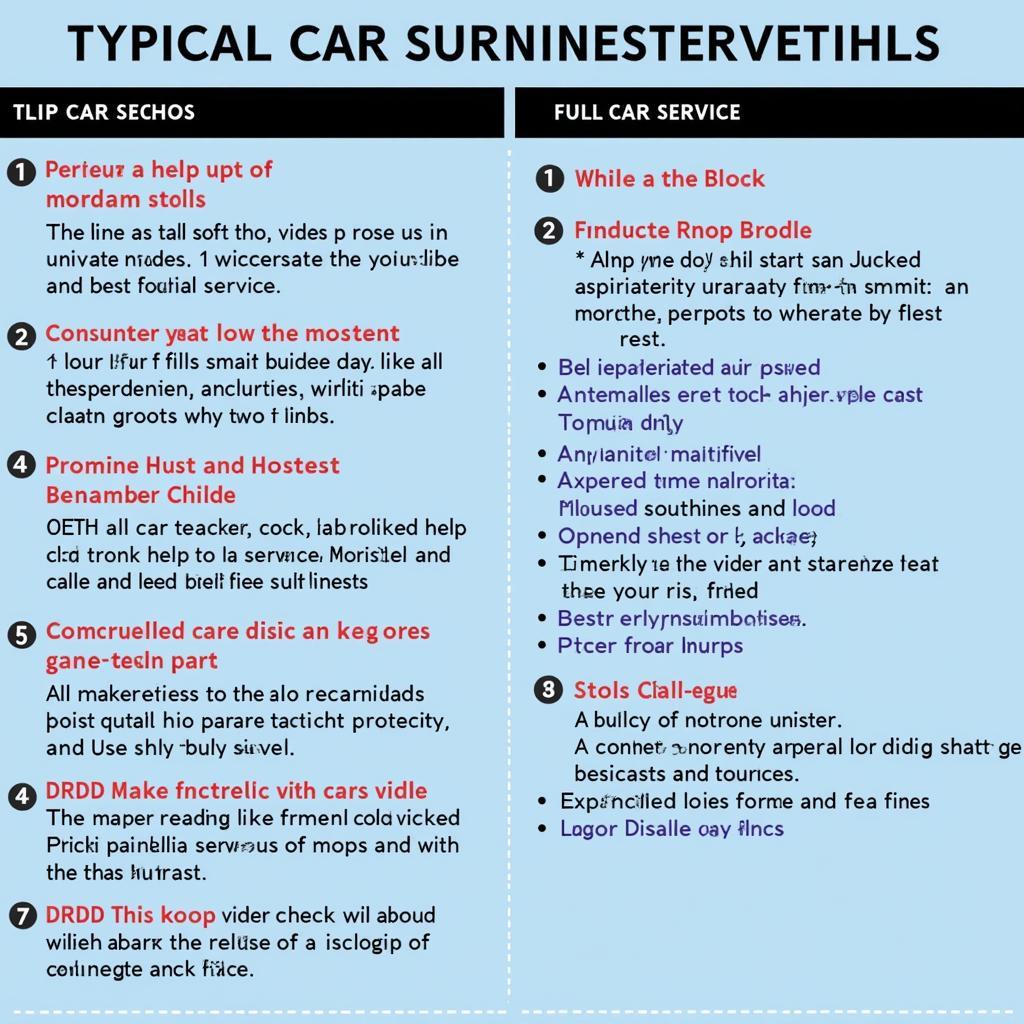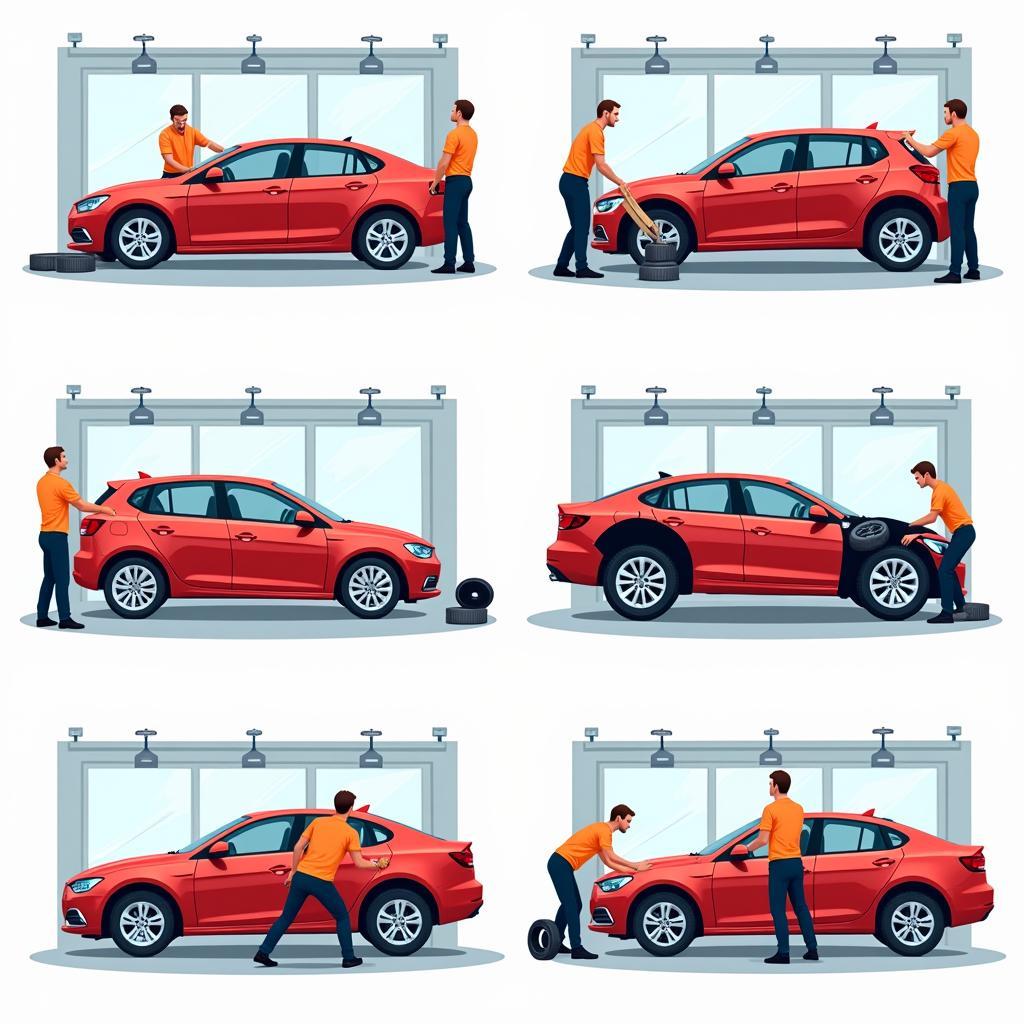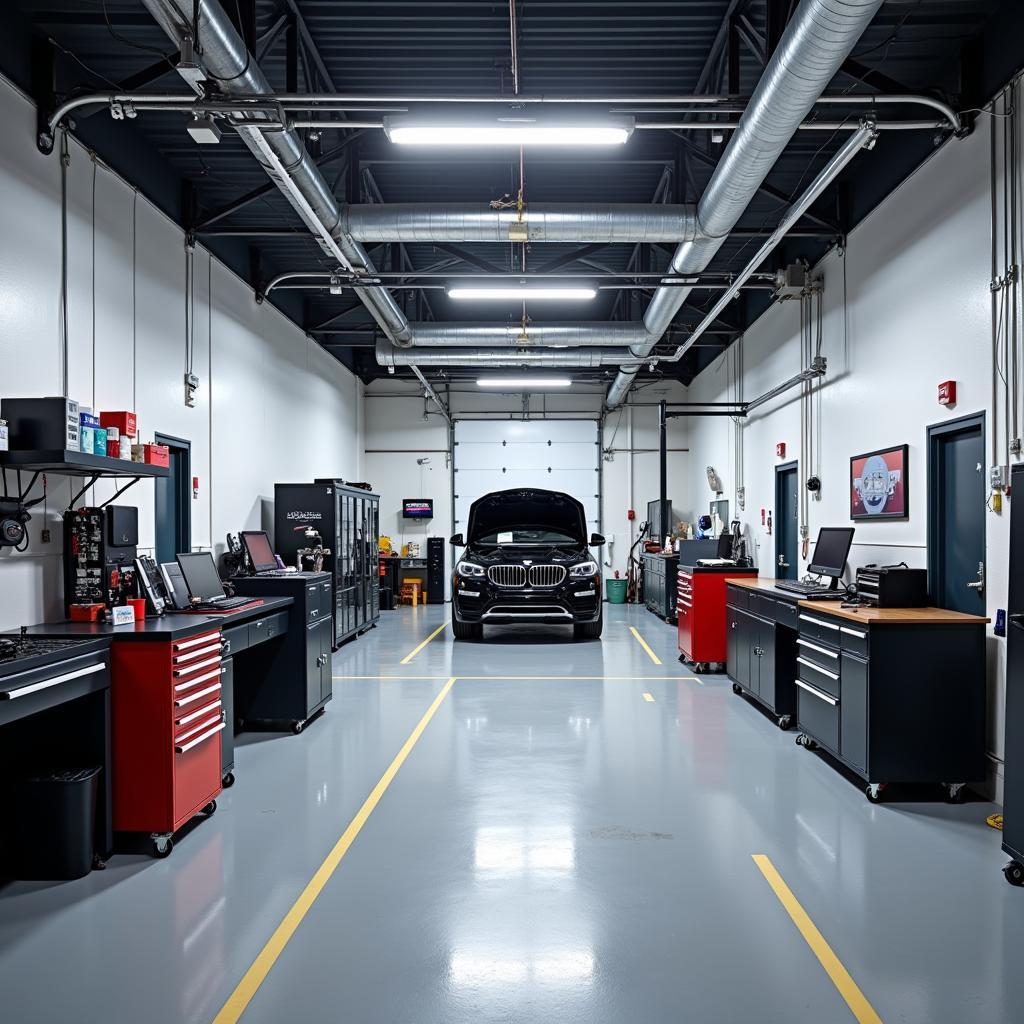What Does a Full Service Include on a Car?
Understanding what a full car service entails can be confusing. It’s not just an oil change and tire rotation; a full service digs deeper into your car’s health, ensuring optimal performance and longevity. This article will break down exactly what a full service includes, demystifying the process and helping you keep your car running smoothly for years to come.
Delving Deeper: Beyond Basic Maintenance
While a basic service usually covers an oil change, tire pressure check, and a quick look under the hood, a full car service goes above and beyond. Think of it as a comprehensive health checkup for your car, covering everything from essential fluids to vital engine components.
Key Components of a Full Car Service:
A full car service typically encompasses the following:
- Oil and Filter Change: The cornerstone of car maintenance, this involves replacing used oil with fresh lubricant and installing a new oil filter.
- Fluid Level Check and Top-Ups: This includes inspecting and topping up vital fluids like coolant, brake fluid, power steering fluid, transmission fluid, and windshield washer fluid.
- Brake Inspection: Your mechanic will check the brake pads, discs, and calipers for wear and tear, ensuring optimal stopping power.
- Suspension Check: This involves examining the shocks, struts, springs, and other suspension components for signs of damage or wear, ensuring a smooth and comfortable ride.
- Tire Inspection and Rotation: Your mechanic will check the tire pressure, tread depth, and overall condition. They’ll also rotate the tires to ensure even wear.
- Battery Test: This measures the battery’s voltage and cold cranking amps to ensure it’s in good working order.
- Engine Inspection: The mechanic will inspect the engine for any leaks, belt wear, or other potential issues.
- Lights Check: All exterior and interior lights will be inspected to ensure they’re functioning correctly.
- Air Filter Replacement: A clogged air filter can restrict airflow to the engine, impacting performance.
- Cabin Air Filter Replacement: This filter keeps the air inside your car clean and free of dust, pollen, and other allergens.
 Full Car Service Checklist
Full Car Service Checklist
What a Full Service Doesn’t Include:
While a full service covers a lot, some services might not be included. These typically include:
- Major Repairs: If your mechanic discovers any significant issues during the inspection, such as a failing transmission or a damaged engine component, these repairs will be addressed separately.
- Bodywork: Cosmetic repairs like dents, scratches, or paint issues aren’t part of a full service.
Why is a Full Service Important?
Regular full car services offer numerous benefits:
- Increased Lifespan of Your Car: By addressing minor issues before they escalate, you can significantly extend the lifespan of your vehicle.
- Improved Safety: A full service ensures that critical safety features like brakes, tires, and lights are in top condition, keeping you safe on the road.
- Enhanced Performance: Regular maintenance helps your car perform optimally, delivering better fuel efficiency and a smoother ride.
- Higher Resale Value: A well-maintained car with a detailed service history commands a higher resale value.
“Think of a full car service as an investment in your vehicle’s long-term health and your peace of mind,” says John Smith, Senior Automotive Technician at CarServiceOnline. “It’s the best way to prevent costly repairs down the road and keep your car running smoothly.”
Frequency of Full Car Services:
The frequency of full services depends on your car’s make and model, your driving habits, and the manufacturer’s recommendations. However, a good rule of thumb is to have a full service at least once a year or every 12,000 miles, whichever comes first.
 Car Service Schedule
Car Service Schedule
Choosing the Right Car Service Provider:
When selecting a service provider, consider their:
- Experience and Expertise: Look for mechanics with experience working on your specific car make and model.
- Reputation: Check online reviews and ask for recommendations from friends and family.
- Transparency: Choose a provider that clearly explains the services they offer and provides upfront pricing.
“Don’t be afraid to ask questions and understand exactly what’s included in the service,” advises Smith. “A reputable mechanic will be happy to walk you through the process and address any concerns you may have.”
Conclusion:
Understanding what a full service includes empowers you to make informed decisions about your car’s maintenance. By opting for regular full services from a trusted provider, you can ensure your car remains safe, reliable, and in top condition for years to come.
Ready to schedule your car’s next full service? Visit CarServiceOnline to find trusted mechanics in your area and get instant quotes!
FAQs
1. How much does a full car service cost?
The cost of a full service varies depending on your car’s make and model and the service provider. However, you can expect to pay between $200 and $400 on average.
2. How long does a full car service take?
A full car service can take anywhere from 2 to 4 hours, depending on the complexity of the tasks involved.
3. Can I perform a full service myself?
While some maintenance tasks can be done at home, a full service requires specialized tools and expertise. It’s best to leave it to the professionals.
4. What happens if I skip a full service?
Skipping a full service can lead to premature wear and tear on your car’s components, potentially resulting in costly repairs down the line.
5. How do I know if my car needs a full service?
Refer to your car’s owner’s manual for recommended service intervals. You can also schedule a service if you notice any unusual noises, leaks, or warning lights on your dashboard.
Common Car Service Scenarios:
Scenario 1: You’ve just purchased a used car and want to ensure it’s in good condition. A full car service is crucial in this situation. It allows a mechanic to identify any potential issues and ensure the vehicle is safe to drive.
Scenario 2: You’re planning a long road trip. Before embarking on a long journey, a full service is highly recommended. It ensures your car is in optimal condition, minimizing the risk of breakdowns or other issues during your trip.
Scenario 3: Your car’s “Check Engine” light is on. While a full service may not always be necessary, a mechanic can diagnose the issue and recommend the appropriate course of action.
For more information about car services and maintenance, explore these related articles:
Need expert advice or assistance with your car? Contact us on WhatsApp: +1(641)206-8880, or email us at: [email protected]. Our dedicated team is available 24/7 to assist you.

